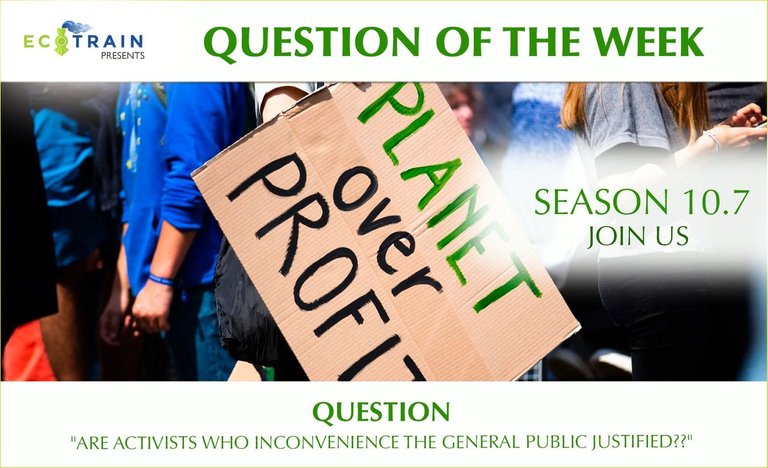This week's @ecotrain QOTW asked us to consider whether it is morally justifiable to protest about an issue in such a way that it inconveniences or disrupts the day to day lives of members of the general public...

There are several variations on this theme, most recently associated with Extinction Rebellion blockading some of the busiest roads and streets in London to raise awareness of the issue of climate change, which they see as real and in urgent need of attention.
But it's not limited to eco-protestors..... there were also the recent anti Covid legislation blockades by Canadian Truckers.
This question is an age old question, a terrific philosophical exercise that makes us drill down into the core principles which we live buy and questions about power and what it means to be human and live with others, who we don't necessarily agree with.
What we are being asked is whether it's morally right to use our physical power to disrupt the lives of people who either (probably) don't care as much about or don't agree with the issue we are protesting about.
I think we need to take into account degree of disruption and intention when it comes to making moral judgements - IF the aim of the protest is simply to create a spectacle to raise attention and get people thinking more about the issue - as is certainly one of the aims with the Extinction Rebellion protests then I'm fine with this - a bit of disruption with no one getting physically harmed to get people thinking is OK.
But then you might say what IF during those protests people are late to job interviews or ambulances are delayed and people die as a result? Just collateral damage?
But if we think like this, we would never do anything so that's maybe unfair!
IF however the point of the protest is to kind of strong-arm the authorities into making legislative changes or deliberately prevent people from doing something (like filling up with fuel for their cars) then it's another degree up - that's moving closer to confrontational methods which I'm not sure is likely to move people towards consensus, more likely to create friction and division so possibly counter productive.
And of course it doesn't help that such protests are being done in the context of imperfect knowledge.
I am sympathetic towards protesting for a cause and not too fussed if people's ordinary mundane lives are disrupted - most people are sheeple after all, and possibly it's better off with MORE disruption to keep people on their toes.
After all, what's the alternative: the cosy middle-class privatised, passive high consumption descent into mundanity?
Very J G Ballard.
But all his folks seem to get bored in the end and commit mayhem.
When everything goes POP! maybe!
When the artisan bakery closes down.
Hehe 😁.
Have you read any of his books? They're often dystopian stories about the ultimate effects of consumerism. I guess they verge on sci-fi but they are presented as something else - a crime novel or something.
I've only read Empire of the Sun as part of A-level English Literature, that put me off, are any of the rest any good?!?
Okay - that's autobiographical I think?
The one I remember reading is Cocaine Nights, but I'm sure I've read others.
Interesting discussion on wikipedia:
I disagree with Budrys - too literal rather than understanding the stories as metaphors.
I wasn't aware it was autobiographical?
Maybe I'll give him a go! Haven't read a novel in ages!